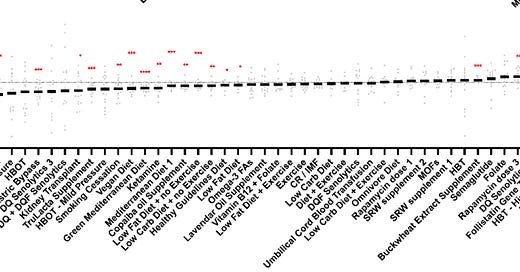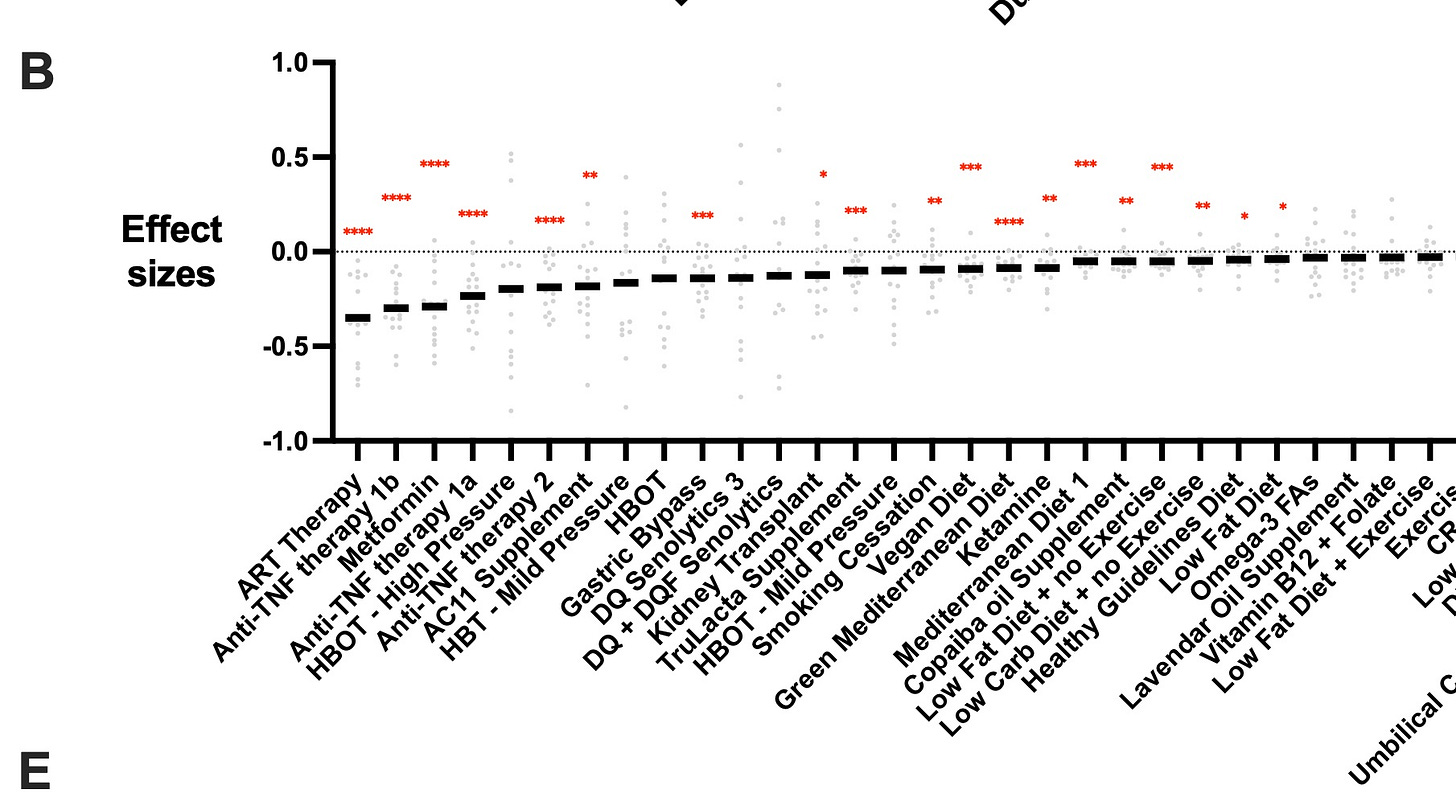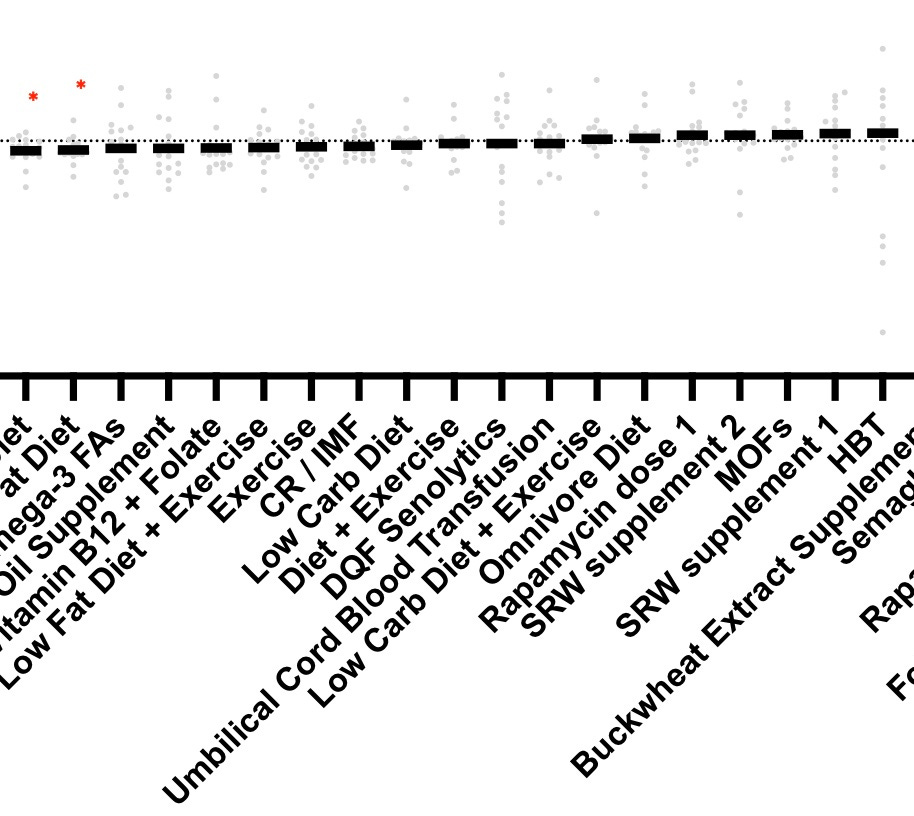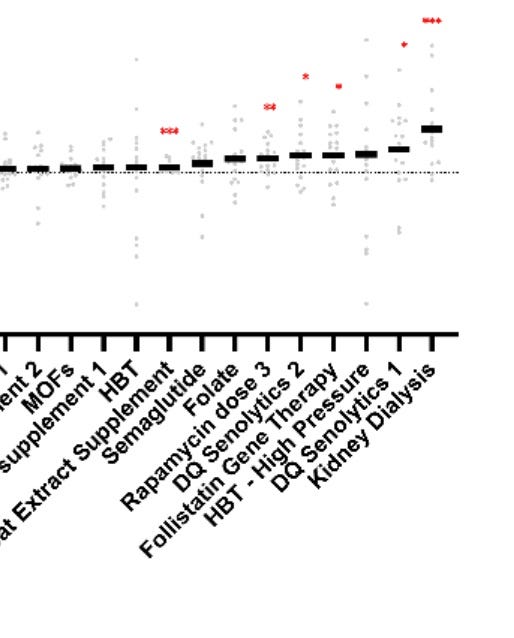There’s a new preprint study out that looks at how various supplements, dietary changes, and other lifestyle changes affect biological age tests. The Yale researchers took the data from 51 different intervention studies and calculated DNA biomarkers and epigenetic clocks for each study. This allowed them to compare the different intervention studies to see the possible effects on longevity and aging across multiple aging biomarkers.
Essentially, they are trying to tease out what actually works.
To be totally honest here, I didn’t understand all of the mathematical modeling they were doing with these epigenetic and biological age factors.
Study findings:
Here’s what they found:
Decreases biological age (makes you younger):
Let’s zoom in on the part that statistically worked to decrease biological age:
Looking at the statistically significant ones (marked with red ** above them), we get the following as beneficial for reducing biological age:
Metformin
Anti-TNF therapy
AC11 Supplement (promoted as supporting DNA repair)
ART therapy (not sure what this is)
Gastric bypass
TruLacta Supplement
Stopping smoking
Ketamin
Copaiba oil
For dietary interventions, these showed positive results:
Vegan Diet
Green Mediterranean diet
Low Fat Diet with no exercise
Low Carb Diet with no exercise
Healthy Guidelines Diet
No effect: Here’s a zoomed-in view of what had no statistical effect on biological age.
Essentially this shows no statistical effect on biological age from:
Exercise
Low-fat diet + exercise
Vitamin B12 + folate
Low carb diet (+ exercise)
Diet + exercise
Quercetin plus dasatinib senolytics (!)
Rapamycin(!)
SRW supplements (longevity supplement company, they also sell a DNA age test)
MOFs (flavonoid supplement)
And here’s a zoomed-in look at the things that statistically increase biological age tests:
Here are the statistically significant results for increasing biological age:
Buckwheat extract supplement
One dosing version of Rapamycin
Follistatin gene therapy
One dosing version of Quercetin plus dasatinib senolytics
Kidney dialysis
What stands out to me:
Blocking TNF (inflammatory cytokine) for the win: The large positive effect of TNF inhibitors was a bit surprising to see, but it makes sense when I think about it. TNF inhibitors are mainly used for autoimmune diseases such as rheumatoid arthritis and psoriasis. Genetically elevated levels of TNF (read about TNF variants here) increase the risk of a number of chronic diseases that are rooted in inflammation - heart disease, IBD, depression, COPD, asthma, gum disease, psoriasis, fibroids, etc.
Natural TNF inhibitors include curcumin, luteolin, hesperidin, rosmarinic acid, and even certain bifidobacteria probiotics.
Diet: Low-fat, vegan, or Mediterranean diets give a better biological age. I would be interested to know if it is the higher levels of vegetables in these diets - or the lack of methionine (an amino acid found in most protein-rich foods). Some of the animal studies on extending lifespan with calorie restriction show that it is actually the methionine restriction that causes the benefit.
TruLacta: This is a supplement made from human milk with a lot of purported benefits. It’s available on Amazon or through their website. I honestly don't know enough about it to comment - maybe an article on "human milk bionutrients" is needed.
Not too much folate: There is either no effect or a negative effect of folate supplementation. I've been suspicious for a while that fortifying foods with folic acid may not be beneficial for everyone. Here’s my article on “Too much folate”.
Exercise: I was surprised that exercise didn’t come out on top with a clear benefit.
Rapamycin: I was also surprised to see the lack of benefit or negative effect of rapamycin on the biological age measures.








